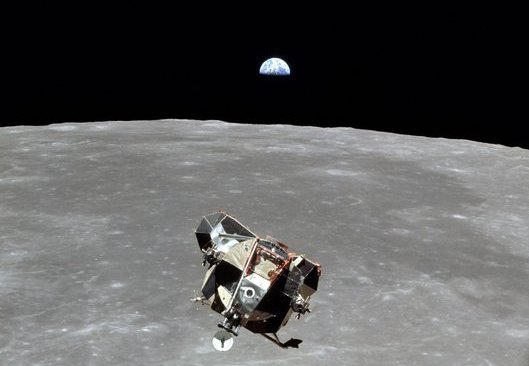
Forty-four years ago this very day, the ground in Florida shook to 7.7 million pounds of thrust as the largest and most powerful rocket ever brought to operational status took flight. For the hundreds of thousands of spectators who lined the beaches and causeways of Cape Kennedy on the morning of 16 July 1969, the sensation was something that was felt, as well as heard, as the mighty Saturn V carried Apollo 11 astronauts Neil Armstrong, Mike Collins, and Buzz Aldrin on the most audacious mission in human history: the first piloted landing on the Moon. The watchers on the ground flinched with astonishment as the vibration and shockwaves pummelled their chests and the soles of their feet and the intense staccato crackle blasted their eardrums. For those who were alive to see it, the launch was something never to be forgotten. But for all of us—including the millions not yet born—it was one of the most momentous events in history. It was our first foray into the universe around us.
Earlier in July, Jan Armstrong called her friend, Lurton Scott, for help. Only a few days remained before her husband Neil blasted off in command of the most pivotal space mission in history. Lurton, the wife of astronaut Dave Scott, and Jan had remained good friends ever since their husbands flew together aboard Gemini VIII in March 1966. Jan had already been invited to watch the Apollo 11 launch from a motor cruiser, owned by North American Aviation and moored in the Banana River, and with Scott’s help and contacts she was able to fly from Houston to Cape Kennedy in a corporate jet. When she arrived in Florida, Jan beheld an astonishing, though unsurprising, sight: over a million people crowded the roads and causeways of the Cape, anxiously awaiting an event whose significance would never be seen again in their lifetimes.
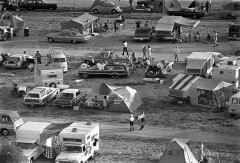
By mid-morning on 16 July, the weather was sweltering; indeed, one observer described it as being so hot that the humid air felt like a silk cloth brushing his face. Yet the historic nature of what was about to happen was magnetic. “Everybody and his brother wanted to be at the launch,” wrote Deke Slayton in his autobiography, “senators, congressmen, ambassadors.” Twenty thousand VIPs were on NASA’s official guest list, including General William Westmoreland—recently back from commanding U.S. forces in Vietnam—Johnny Carson, Vice-President Ted Agnew, and a direct descendent of Napoleon Bonaparte. Lyndon Johnson, the former president and successor to the man who had committed America to the Moon, was there, as was former NASA Administrator Jim Webb. There were also two thousand journalists in attendance, almost half of them from abroad, representing 56 nations. One Czech writer noted an overwhelming sense of goodwill, even as the ugly cloud of war continued to hover overhead: “This is the America we love,” he told his readers, “one so totally different from the America that fights in Vietnam.” Others took a more cynical view, with a handful of pro-communist newspapers operating from Hong Kong expressing criticism of the mission as an attempt to distract the world from the horrors of the conflict and extend American “imperialism” into the heavens.
In his role as head of the Flight Crew Operations Directorate, it was part of Slayton’s job to keep the media away from the astronauts, but even they found themselves taking late-night phone calls from long-lost relatives and old school friends in those final few days.
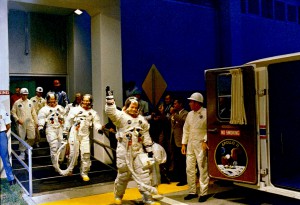
By launch morning, the headlights of a quarter of a million cars twinkled in the pre-dawn darkness as spectators arose from their backseats, from their tents, from beneath makeshift blankets, from inside their camper vans, and even from their boats anchored in the Indian and Banana Rivers. Those fortunate to have actually been there would later say that the proceedings did exhibit something of a “carnival” atmosphere—there were snack bars and bikini-clad spectators firing up barbecues and opening beer coolers—but the sensation remained calm. This was particularly true when astronauts Neil Armstrong, Mike Collins, and Buzz Aldrin emerged into a glare of television lights. “You get a feeling,” CBS commentator Eric Sevareid told Walter Cronkite, “that people think of these men as not just superior men, but different creatures. They are like people who have gone into the other world and have returned and you sense that they bear some secrets that we will never entirely know … ”
The eyes of the world were truly riveted on this event, none more so than in Armstrong’s home town of Wapakoneta, where his parents, Steve and Viola, watched the proceedings on a colour set donated by the television network. On the evening before launch, more than two hundred cars circled the area close to their home. The mayor requested that everyone display American flags in their windows, the local dairy sold its own “Moon Cheeze,” and restaurants provided daily supplies of pies, bananas, and chips. Local children began to claim their father was Armstrong’s barber, their mother was Armstrong’s first girlfriend, and so on.
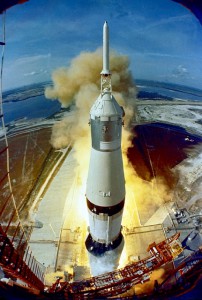
Notwithstanding this public and media frenzy, some felt that the secrets of the Moon were better left alone, until other, more pressing, more earthly issues had been addressed. In many parts of America, Apollo’s $25 billion price tag had been a hard pill to swallow, and a hefty proportion of taxpayers felt improving the education system, dealing more effectively with poverty, improving the standard of living and the civil rights of minorities, and ending the conflict in Vietnam were far greater national priorities. Reverend Ralph Abernathy, head of the Southern Christian Leadership Conference, was planning a protest with four mules and one hundred and fifty members at the Cape Kennedy gates; his particular focus was upon using Apollo money to help the poor. Still, even he was awed by the events of 16 July 1969 and the days that followed.
That Wednesday, launch was scheduled for 9:32 a.m. EDT, which dismayed Mike Collins because he had to awaken at the ungodly hour of four in the morning. His last mission, Gemini X, three years before, had blasted off in the late afternoon, allowing Collins and his commander, John Young, to get up at a more civilised time of the day, “but no such luck this time.” It was Deke Slayton who came knocking on all three men’s bedroom doors and, after showering and dressing, they headed down to the crew quarters’ exercise room, where their nurse, Dee O’Hara, waited to perform final medical checks. Next came a final appointment with chef Lew Hartzell and the traditional “low-residue” astronauts’ breakfast of steak and eggs, toast, fruit juice, and coffee—shared with Slayton and Collins’ backup, Bill Anders—followed by the laborious process of donning their snow-white space suits.
In his autobiography, Carrying the Fire, Collins related that during the Gemini project they had suited-up in a trailer near the launch pad, but now, on Apollo, NASA had built “an elaborate suit maintenance, storage, and donning facility near the crew quarters.” As each man’s fishbowl-like helmet was snapped into place, he felt the welcome whoosh of pure oxygen rushing past his face … and the knowledge that, for the next eight days, he would breathe no more outside air; it would all come from their portable, hand-carried supplies, from the command or lunar module atmosphere, or, for Armstrong and Aldrin on the surface of the Moon, from their backpacks. Lumbering outside into the blaze of television lights, all three men looked extraterrestrial, sealed as they were in their bulky suits, their protective yellow galoshes adding a slightly comical touch to their appearance.
When the transfer van arrived at Pad 39A, the astronauts ascended to the white room and were greeted by the closeout crew, including Fred Haise, the backup lunar module pilot, clad in clean-room garb and hat, who had been there for almost two hours making sure that each one of Columbia’s switches was set correctly for launch. As Armstrong clambered aboard, he was handed a bon voyage gift by pad leader Guenter Wendt—a small crescent-shaped trinket, fashioned from foil-coated styrofoam—and was told that it was the key to the Moon. Unable to take it with him, Armstrong asked Wendt to keep it until he returned home, and then gave the self-styled pad “fuehrer” a mock space-taxi ticket, good between any two planets.
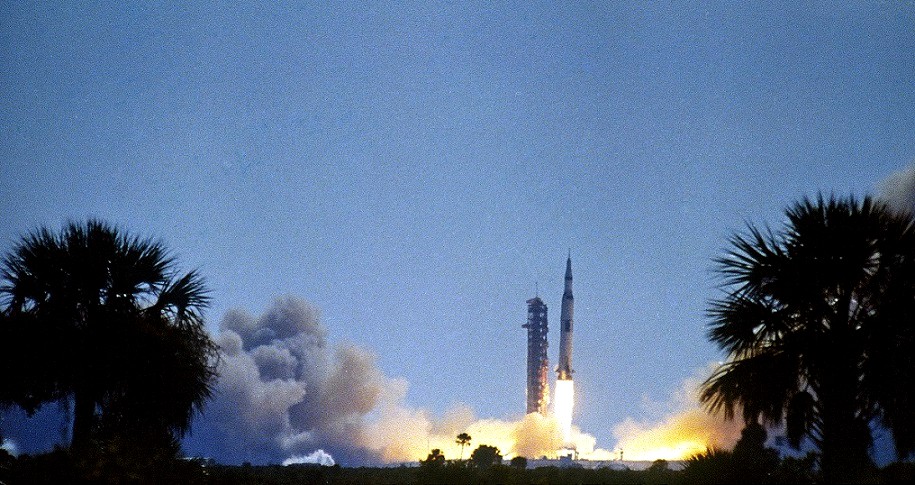
It was traditional, Mike Collins wrote, to present Wendt with light-hearted gifts. “Guenter has spent the past couple of weeks telling me what a great fisherman he is,” he explained, “and how he regularly plucks giant trout from the ocean. In return, I have located the smallest trout to be found in these parts, a minnow really, and have had it, uncured, nailed to a plaque, and inscribed Guenter’s Trophy Trout.” Secreted in a suspicious-looking brown paper bag, Collins presented the “tribute” to Wendt, then took his place in the command module’s right-hand seat.
Normally, the command module pilot occupied the center position, but Buzz Aldrin’s previous stint as backup senior pilot on Apollo 8 made it more practical to continue that way. “Collins had been out for a while” following neck surgery, wrote Armstrong’s biographer, James Hansen, in his book First Man, “so rather than retrain Buzz for ascent, NASA just left him in the center and trained Mike for the right seat.” Finally, Aldrin squeezed himself through Columbia’s hatch and dropped into the center couch.
As the minutes ticked away and the three astronauts steeled themselves for launch, one of Collins’ greatest worries was the risk of screwing up on this of all missions, under the spotlight, with a third of the world’s population watching or listening. Of key concern was the handle next to Armstrong’s left knee, which the commander could twist counter-clockwise to fire the Saturn V rocket’s escape tower and pull the command module to safety in the event of an abort. Looking across the cabin, Collins noticed with horror that the pocket adorning Armstrong’s suit leg was uncomfortably close to the handle. (In fact, this was no ordinary pocket: in a few days’ time, it would be used to store a “contingency sample”—the first few grains of lunar soil ever picked up by a human being.) For now, though, Collins feared that the pocket had the potential to ruin the mission. “It looks as though if he moves his leg slightly, it’s going to snag on the abort handle,” he wrote. “I quickly point this out to Neil, and he grabs the pocket and pulls it as far over toward the inside of his thigh as he can.” It was was simply too embarrassing to contemplate the headlines: Moonshot Falls Into Ocean and Last Transmission From Armstrong Reportedly Was “Oops.”
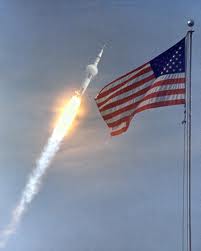
Three minutes before launch the automatic sequencer took command of the countdown and began a computerized run-through of each step required to pressurise the Saturn V’s internal systems before liftoff. At 50 seconds, the gigantic rocket switched to internal power and four of the nine servicing arms linking it to utilities on Pad 39A were disconnected.
Seventeen seconds to go: the final alignment of the launch vehicle’s guidance computer was completed, and it was transferred to internal power. Throughout each of these steps, the commentator continued to report what was occurring, with growing tension and excitement. “T-15 seconds … guidance is internal … 12, 11, 10, nine … ”—then came the start of the ignition sequence, as pressurised RP-1 fuel and liquid oxygen began to enter the chambers of the five F-1 engines—“six, five, four, three … ” as internal turbines built up the supply of propellants to full flow and brought the Saturn’s first stage up to near-full power. As the final milliseconds of the count evaporated, all five engines were running at 90 percent of rated thrust, consuming almost 10,000 pounds of propellant every second. Finally, as the launch pad’s deluge system flooded the flame trench with thousands of liters of water to reduce the reflected energy, the Saturn’s internal computer carried out its last checks.
All was well. “ … two, one, zero … all engines running … ”
At 9:32 a.m. on 16 July 1969, the “Launch Commit” signal released a series of clamps holding the Saturn V to the pad and the monster began its climb for the heavens. “Liftoff … we have a liftoff, thirty-two minutes past the hour … ”
Twelve long seconds elapsed before the lumbering Saturn cleared the tower and the hundreds of thousands of spectators began to feel the vibration and shockwaves pummelling their chests and the soles of their feet. From the commander’s seat, Armstrong could be heard announcing the onset of the “Roll Program” maneuver, as the Saturn V’s computer began actively guiding it out over the Atlantic Ocean and onto its proper heading for low-Earth orbit and, ultimately, in barely three days’ time, for a rendezvous with the Moon.
To the onlookers, it was nothing short of spectacular, according to Dave Scott, who was watching from the motorboat on the Banana River with Jan Armstrong. Sitting in the blockhouse at the Cape, Deke Slayton, still awaiting his first space flight after ten years as an astronaut, could only watch silently as the rocket thundered into a clear sky. “I think most of us felt like we were lifting it all by ourselves,” he wrote later. Astronaut Tom Stafford, having ridden one of these beasts a few weeks earlier on Apollo 10, now found himself seated in Cape Kennedy’s VIP area between Lyndon Johnson and Ted Agnew, his chest blasted by the intense roar.
For the Apollo 11 crew, encased in their space suits within the very nose of the behemoth, the sensations were unlike their previous experiences. All three men had previously ridden the Titan II rocket on their Gemini missions, but, rather than the sudden G forces at the instant of liftoff, “there was an unexpected wobbly sway,” wrote Buzz Aldrin in his memoir, Men from Earth. “The blue sky outside the hatch window seemed to move slightly as the huge booster began its pre-programmed turn after clearing the tower. The rumbling grew louder, but it was still distant.” For his part, Mike Collins felt that the Saturn was “a gentleman” compared to the Titan; despite the shock of staging, the G loads seemed to build no higher than 4.5 and the whole ride proceeded as “smooth as glass, as quiet and serene as any rocket ride can be.”
The Saturn behaved with perfection, executing each step of its flight regime precisely: the S-IC first stage burned out and separated two minutes and 40 seconds into the climb, followed at three minutes and 17 seconds by the jettisoning of the escape tower, which allowed sunlight to flood into the cabin. For almost six more minutes, they rode the S-II second stage’s five exceptionally smooth J-2 engines, and then the single J-2 of the “crisp and rattly” S-IVB third stage.
When this stage shut down eleven minutes and 40 seconds after launch, it was travelling at in excess of 17,900 mph in a circular parking orbit at an altitude of 116 miles. By this point, Apollo 11 was barely four percent of its weight at liftoff. Despite having launched into orbit atop the largest and most powerful rocket ever brought to operational status in human history, the men of Apollo 11 had yet to even begin their primary mission. Even the three-day journey to the Moon was a trail already blazed by two previous Apollo crews. Not until 20 July 1969 would Armstrong, Collins, and Aldrin truly enter the realm of the unknown.
Want to keep up-to-date with all things space? Be sure to “Like” AmericaSpace on Facebook and follow us on Twitter:@AmericaSpace
Missions » Apollo »
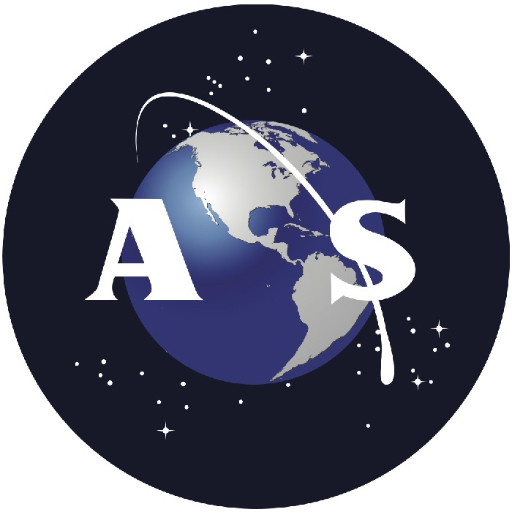



Blame my comment on the effects of having a bad day, but the simple fact that there aren’t any people living on the Moon to celebrate the 44th anniversary of Apollo 11’s launch today, is one of humankind’s most massive failings…
If one is to blame your very insightful and accurate comment on your having a bad day Leonidas, then many of us must have also shared your bad day my friend. I couldn’t agree more with Ben’s powerful statement in the caption of the photo of the proudly-waving American flag in front of the magnificent Saturn V: The loss of the Project Apollo impetus “is one of the greatest tragedies of the early Space Age.” One can only imagine how future generations will judge us.
It is very likely that had this impetus been left to come to fruition, then quite possibly, the fictitious wonders depicted on ‘2001: A Space Odyssey’ (a child of that real-life first wave of lunar exploration that Apollo represented), would have come to pass and we’d probably be celebrating the second generation of children born on the Moon today. (And I’d want a Clavius Moonbase anyday, with or without the Monolith!).
The fact that the lack of all these doesn’t seem to bother anyone, is another tragedy altogether.
(By the way Karol, if you haven’t, please read Stephen Baxter’s two short stories, ‘Moon Six’ and ‘Columbiad’. They echo some of the sentiments we share here, and they’re both dynamite!).
I dont know, but all these anniversaries seem more and more depressing as time goes by considering the realities of today. Yet, I don’t lose hope altogether, cause I still believe in the very deep instincts of exploration and longings for knowledge that permeate the human spieces.
Cause deep down at the core, space exploration is the expression of a deep spiritual longing to commune with the Universe, to commune with the Infinite (at least it is for me!).
I too share the feelings, and I find that I’m writing more and more in an alternate history in which we didn’t throw it all away, but built upon our successes, and the fiftieth anniversary of the first lunar landing is celebrated on the Moon and Mars as well as on Earth. And more and more I say that I live in this timeline only because I have no choice, and that if the opportunity for a choice presents itself, I’m so outta here and off to the world I see in those wonderful dreams and visions that form the basis for so many of my current writing projects.
You would be doing a great service to the world, if you’d publish these writings Leigh!
Two stories have already seen publication: “Tell Me a Story” in the anthology _Rocket Science_, and “Once a Chekist” in the anthology _Mortis Operandi_. The rest are either still in progress or are on various slushpiles, looking for a home.
The photo of Armstrong leading his crew along with the launch pictures of the Saturn V might sadly represent the height of American space leadership. It would demean the legacy of Apollo to allow other nations to usurp our technological prowess in space exploration.
Tom, it is with an eerie sense of foreboding that I too look upon those photos of the heroic Armstrong and his brave crew, and the technological miracle of the mighty Saturn V, and wonder (may God have mercy) if our beloved America reached it’s zenith at “one small step”. Ramses II and Alexander the Great ruled the known world, Caesar and Pax Romana could not possibly fall, the aristocracy trembled in fear at the mention of the name Napoleon, and the sun never set on Queen Victoria’s British Empire. Can you think of a moment in our history that will stand out in the minds of students in the 29th century more than that momentous day in the latter part of the twentieth century when a human foot touched something other than Earth? As Leonidas stated in his customary highly articulate manner, the fact of our [loss of direction, dedication, and inspiration] “doesn’t seem to bother anyone, is another tragedy altogether.” In comparison to many nations, our educational system is grossly inadequate and cannot possibly provide the mathematicians, physicists, engineers, etc. that we MUST have. China graduates more English-speaking engineers than does the United States, but we got ’em beat on American Idol contestants and NBA NFL wannabes. Here in bordering-on-bankruptcy-once-the- Arsenal-Of-Democracy Detroit, few pay attention to the daily body count and televised supplications of weeping mothers as the scrappers feed on the vertical scrap-yard of once thundering glowing factories. There seems to be no way out from under our crushing national debt. Our beautiful, courageous, intelligent young people die in tribal, 11th century countries that don’t give a damn about Jeffersonian democracy and that the overwhelming majority of Americans can’t even find on a map. But then, do most Americans know the reason for the gruesome slaughterhouse that was World War I? Yes, we can currently turn any nation on Earth into a sheet of glass, but is that enough? Does being a great nation, does being The United States Of America demand more? Tom, my obviously contemplative, articulate, and intelligent friend, I too look at photos from those glorious years of the golden age of space exploration with great pride, heartfelt gratitude, sincere respect, . . . and uncertainty, sense of loss, deep concern, mistrust, and loathing of “carpetbaggers” with little more than hot-tub inspired fantasy coupled with power-point presentations and political connections. Can America still produce an Alan Shepard and Neil Armstrong, and the geniuses that sent them on their historic missions? If we cannot . . . .
Both Tom and Karol pose an excellent question about America’s zenith being the Apollo missions, and the subsequent fall from grace afterwards. And your historical parallels Karol are so excellent and insightful!
I really don’t want to repeat myself, but I’m inclined to re-post a comment I posted at an earlier AmericaSpace article, that I believe worths being repeated here:
“From 1405 to 1433, large (Chinese) fleets commanded by Admiral Zheng He—under the auspices of the Yongle Emperor of the Ming Dynasty—traveled to the Indian Ocean seven times. This attempt did not lead China to global expansion, as the Confucian bureaucracy under the next emperor reversed the policy of open exploration and by 1500, it became a capital offence to build a seagoing junk with more than two masts. Chinese merchants became content trading with already existing tributary states nearby and abroad. To them, traveling far east into the Pacific Ocean represented entering a broad wasteland of water with uncertain benefits of trade.” – from Wikipedia.
Does anyone see the historical parallels here? They literally raise the hair on the back of my neck! The Chinese during the Ming Dynasty made seven voyages to the Indian Ocean. The US made 9 Apollo flights to the Moon in total and 6 landings. In both instances, later political leaderships chose to reverse the policy of open exploration. The Chinese Confucian bureaucracy that followed the Ming Dynasty, saw the open ocean as a useless wasteland, with no practical value. How do we see space today? Does all these ring a bell?
When the Chinese chose to step down from the exploration of the open seas, the Europeans were more than willing to take their place. 1492 anyone?
It would be the uttermost irony of all of history, if the Chinese were the ones to finally settle the Moon (being a space advocate, I’d prefer that somebody, whomever does it than noone at all, but still…).
Karol & Leonidas: exceptional insights from you both! The historical parallels are quite evident. The more I ponder the greatness of Apollo, the more it troubles me that we have lost our focus. We accomplished the “impossible” with relatively crude technology while our “sophisticated” technology today is being wasted because we are meandering. It’s almost as if our drive to be the best was a wasted effort. I want to remain optimistic but it is indeed difficult.
The US is a ‘sleeping giant’ right now. Rest-assured, complacent and pleased with itself. Maybe a second ‘Sputnik moment’ will be what it takes to make it come out of its quiet slumber. What will that moment be? Maybe a Chinese manned landing on the Moon, and subsequent efforts to exploit the lunar resources there. If that were to happen, what would stop the Chinese from withdrawing from the Outer Space Treaty and claim some piece of land on the Moon, rich in vital resources? Maybe the US deserves to be beaten by China in this effort. Its the outcome of too much compacency.
Just maybe…